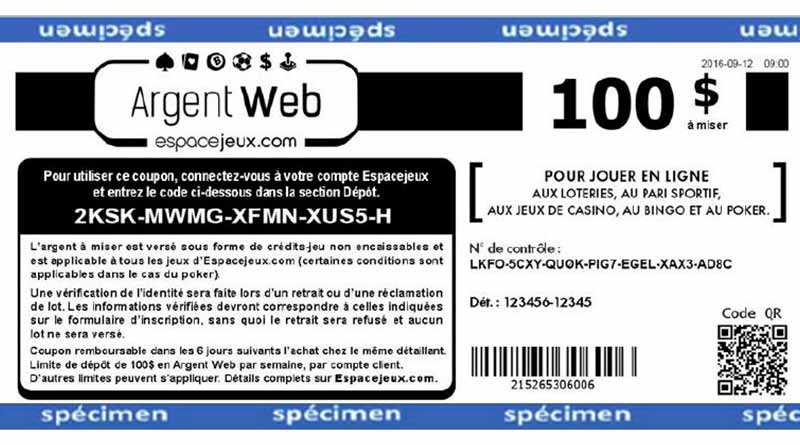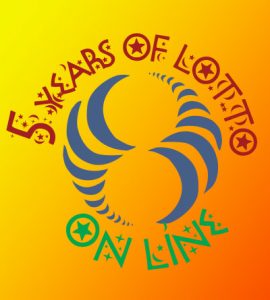Part 3 – With “Argent Web”, Two Birds In The Bush Are Better Than One In The Hand
It’s been over five years now since Loto-Québec started selling online lottery, a move that initially sparked great concern among retailers.
So five years later, where are we? As part of our SPECIAL FEATURE LOTO-QUÉBEC, FIVE YEARS OF LOTTERY ONLINE, DepQuébec takes a deep look at the phenomenon throughout the week to assess its various impacts on brick-and-mortar retailers.
Today, in the third part of this series, we look at the “Argent Web” (meaning Web Cash), the product imposed to retailers by Loto-Québec in replacement of online sale commissions.
According to the expression One bird in the hand is better than two in the bush, it is better to have an advantage or opportunity that is certain than having one that is worth more but is not so certain.
So when Loto-Québec decided, last year, to unilaterally replace the commissions already granted to retailers for online lottery sales by the “Argent Web” (Web Cash), they took on the challenge of convincing them to the contrary.
But what is it really? Are retailers making a good deal or are they being taken advantage of? Let’s have a closer look.
Innovators or sorcerer’s apprentices?
First, why did Loto-Québec set up commissions on online sales in the first place if it was to retrieve them four years later?
The Crown corporation has indeed been among the first gaming Corporations in North America to migrate lottery sale on the Internet in 2012.
In Canada, however, British Columbia is the true pioneer in this area.
Already 13 years ago, in 2004, the British Columbia Lottery Corporation (BCLC) launched PlayNow.com, an online lottery and gaming platform.
In December 2010, when a PlayNow.com customer won the biggest online jackpot in Canadian history, $ 7.6 million of 6/49 (source: here), Loto-Québec finally launched its own platform called “espacejeux.com”, and not without having to overcome some resistance from the inevitably orthodox and most often fanatical public health community. As for Ontario, it was not until January 2015 that the OLG launched its PlayOLG.ca platform.
In the United States, however, such move is not an easy task. As evidence, only five out of 50 states had migrated their lotteries on the Internet at the end of 2017! The reason being that south of the border, they most often have to adopt or modify laws to do so, while Loto-Québec, for its part, has the freedom to do what it wants without resorting to a vote of the National Assembly.
However, success remains a delicate and balanced act since a Lottery Corporation must:
- filter players to make sure they are adults;
- control where players are located, so as not to cannibalize sales from other regions;
- offer the full range of compulsive gambling prevention measures (eg self-exclusion);
- prevent fraud, piracy and abuse of all kinds;
- and finally, include retailers as much as possible in the solution in order to address their concerns.
It is in light of this last point that Loto-Québec has likely introduced an online sales commission system of 6% for designated sales (i.e. when a customer pinpoints a specific store to receive the sale commission) and 2% for non-designated sales. Then, it has probably realized at some point that it was the only lottery Corporation to do so! … as for the Web Money concept, it had already started in some U.S. States.
But what is it exactly?
Another way to pay
The Argent Web (see flyer here) is a complementary way to inject money into your EspaceJeux.com account from which you can play online casino games (poker, blackjack and others) or even buy the lottery.
This system already exists in Kentucky under the names iFunds and iGift and is being implemented right now in British Columbia under the name Web Cash.
When opening an EspaceJeux account, one has the possibility or not to register a credit card. In this case, each withdrawal of money from the card may incur significant money advance fees and very high interest payment.
Testing the system, we injected recently $ 20 into the account from a credit card. A week later, a fee of $ 3.50 was billed to us by the card issuer for a “cash advance”, plus interest of $ 0.15, which corresponds to an interest rate of approximately 20%, applicable from the date of the cash advance until the repayment of the latter.
It is therefore quite unattractive for anyone to use its credit card to buy online lottery because of such fees. However, one can pay by Interac or directly from its bank account without fees.
And this is precisely where Web Money becomes interesting: as a way for consumers to avoid the cost of cash advances on their credit card.
For example, a customer willing to spend money he doesn’t have through a credit card can do so free of charge by buying Argent Web coupons of $ 10, $ 25, or even $ 100 in a convenience store. This is so because the retailer or seller’s type of business is what determines, from VISA’s point of view, whether the transaction is a cash advance (with huge fees) or a normal expense (without specific charge).

Seen this way, the Argent Web is not so much a favor that Loto-Québec gave to retailers as a huge service to itself: this tool actually allows it to take the credit card fees thorn out that hitherto prevented consumers from really letting themselves loose online! Loto-Québec can now fully realize the leverage effect of credit card debt to enhance its online lottery and gaming sales and the explosive growth of online sales in recent months seems to confirm this analysis.
It can also reach a class of consumers who, for all sorts of reasons, do not have bank or credit cards. These people who live in cash can now open an EspaceJeux.com account with their only driver’s license or health insurance card and fill it up with Argent Web bought from the convenience store.
Retailers are divided
The many retailers we spoke to have various opinions about this product.
Most appreciate the fact that it encourages in-store sales, as a customer who comes in a store always buys something else in general. That’s a plus, for sure.
It’s also a gain for retailers in the sense that Argent Web can also be used to play casino games, making these sales commissionable when they were not. That’s a second plus.
And let’s be generous: it is also a product that does not require much maintenance or inventory, just like the 6/49. So a third plus.
But there stops the positive.
A barely profitable product
The commissions on lotteries sold in stores are 6% and those on scratchers, 8%. In Kentucky, the iLottery (equivalent to Argent Web) is commissioned at 5% (see source here).
As for the Argent Web, retailers are unanimous in denouncing the meager 3.5% commission. Because unlike commissions earned on online sales, in this case, there is real work required to perform, manage and administer all these transactions! And these come with significant time and management costs.
It is therefore easy to demonstrate that this product is barely profitable.
First, half, if not the majority of consumers, will pay the Argent Web by credit cards since, as we mentioned above, the main benefit of this product is precisely to avoid cash advance fees.
So, this just removed about 1.5% on average of the 3.5% commission (and it could be more, depending on the type of credit card used): only remains a microscopic 2% commission.
Then, according to a Bank of Canada study, an average credit card and cash transaction results in significant additional costs when considering the time of the transaction itself, bank fees, management errors, etc.
In other words :
- A $ 10 Web Money Coupon brings in only $ 0.20 (not $ 0.35) if paid by credit card, minus the store’s management fees;
- A $ 25 Web Money Coupon brings in only $ 0.50 (not $ 0.88) if paid by credit card, minus the store’s management fees;
- A $ 50 Web Money Coupon brings in only $ 1.00 (not $ 1.75) if paid by credit card, minus the store’s management fees;
- Finally, a $ 10 Web Money Coupon brings in only $ 0.35 if paid in cash, to which the store’s management fees must be deducted.
Does Loto-Québec realize that a minimum wage employee (totaling $ 13.08 per hour all inclusive) costs $ 0.22 per minute? And that it is only a drop of water in a sea of operating expenses!
Not an alternative: an add-on
But the fundamental question remains why did Loto-Québec drop the online commissions for this product, and not just add it to whole retailer benefit package!
If the initial idea was to compensate retailers for online sales, Argent Web should have simply be added to the commission system and not have replaced it all.
Because if we compare the current situation with that which prevailed before, Loto-Quebec comes out as the sole great winner of Argent Web’s introduction:
- it eliminated all online commission management and fees since 2012 (designated sales, non-designated sans and jackpot commissions), which are expected to generate substantial savings;
- it now pockets all jackpot commissions on lottery sold online;
- it caps retailers’ commissions at 3.5% for only the portion of sales they make;
- it offers its customers a way to bypass credit card fees.
Conclusion: while retailers have lost all the commissions they used to have on online sales, Loto-Québec loses absolutely nothing: in fact, it wins on all counts.
Not to mention that the more popular online sales become, the more likely store sales will declined, whether we like it or not.
We are therefore a bit skeptic when the lottery Corporation claims to have improved retailer benefits: we rather believe – as we see – that it did improve its own benefits first and foremost.
Otherwise, it would have kept the old system and ADDED Argent Web to it, an add-on, not an alternative.
Tomorrow, in Part 4 of our online lottery series, we will examine how the lottery profitability for convenience stores has evolved over the last 20 years and what the future holds for this product category.







